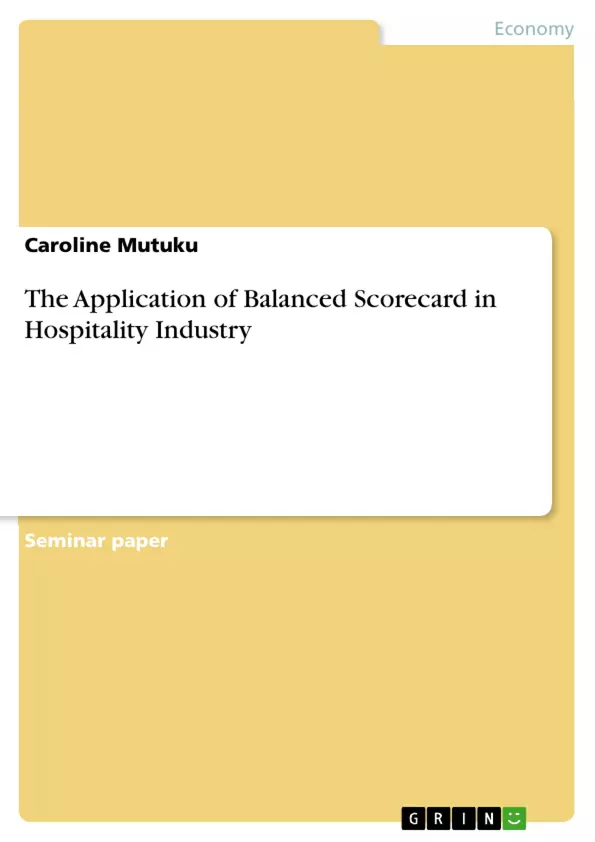This essay will focus on the use of BSC in the hospitality industry, and our case study the Hilton Hotels worldwide. The essay will show how BSC has been used in Hilton Hotel to measure the company performance. It will also discuss how the management compensation plan has been linked with the BSC.
The increase in competition in the hospitality industry for instance, in the hotel sector has attracted interest in quality improvement and implementation of performance measurement systems in these organizations so as to achieve a competitive advantage in the global market. A good example of the performance measurement system is the use of the Balanced Scorecard (BSC) to translate the strategic goals of the company for instance, research and development into performance measures. Continuous quality improvement in the hospitality industry is essential and it has been used by managers to measure their performance in four different perspectives, customer, financial, internal business process, and learning and innovation. BSC is important to managers because it helps them achieve their strategic goals in one area without having to hurt the other area. On that note, BSC has been used by managers to overcome strategic management problems because BSC is strategy-driven hence important in the implementation of a business strategy.
Inhaltsverzeichnis (Table of Contents)
- Introduction
- Balance Scorecard (BSC) Systems
- History of BSC
- Four perspectives of BSC
- Financial
- Customer
- Internal Business Process
- Learning and growth
- BSC in Hospitality
- Characteristics of the hospitality industry
- Balanced Scorecard in chain-brand hotels
- Balanced Scorecard at Hilton Worldwide
- Limitations and Weakness of BSC
- Conclusion
- References
Zielsetzung und Themenschwerpunkte (Objectives and Key Themes)
This essay explores the application of the Balanced Scorecard (BSC) in the hospitality industry, focusing on the Hilton Hotels worldwide as a case study. It aims to demonstrate how the BSC can be used to measure company performance and how management compensation plans can be linked to it.
- The importance of performance measurement systems in the hospitality industry to gain a competitive advantage.
- The four perspectives of the BSC: financial, customer, internal business process, and learning and growth.
- The application of the BSC in chain-brand hotels, particularly Hilton Hotels.
- The unique characteristics of the hospitality industry and how they influence the use of the BSC.
- The potential limitations and weaknesses of using the BSC.
Zusammenfassung der Kapitel (Chapter Summaries)
The introduction outlines the increasing competition in the hospitality industry and the importance of performance measurement systems such as the BSC. The chapter highlights the strategic goals of the company, the significance of continuous quality improvement, and the role of the BSC in achieving strategic objectives. The chapter also introduces the case study of Hilton Hotels worldwide and previews the essay's focus on the use of the BSC in the hotel industry.
The chapter "Balance Scorecard (BSC) Systems" explores the history of the BSC, developed by Dr. David Norton and Dr. Robert Kaplan at the Harvard Business School. It emphasizes the central role of learning in business operations and its impact on customer satisfaction and financial growth. The chapter delves into the four key perspectives of the BSC, providing a detailed breakdown of each perspective and its associated measures.
The chapter "BSC in Hospitality" analyzes the unique characteristics of the hospitality industry, highlighting its service-oriented nature, focus on human interaction, and the importance of relationship building. The chapter discusses how the BSC has been implemented in chain-brand hotels, particularly Hilton Hotels in South Africa, demonstrating its effectiveness in increasing revenues per room. It explores the strategies employed by Hilton Hotels to leverage the BSC for success, including focusing on both short-term and long-term drivers, strengthening brand equity through quality control, rewarding teamwork, and integrating the BSC with innovative processes.
Schlüsselwörter (Keywords)
This essay focuses on the application of the Balanced Scorecard (BSC) in the hospitality industry, particularly in chain-brand hotels like Hilton Worldwide. Key terms and concepts include performance measurement systems, competitive advantage, strategic goals, customer satisfaction, financial growth, internal business processes, learning and growth, hospitality industry characteristics, and management compensation plans.
Frequently Asked Questions
What is the Balanced Scorecard (BSC)?
The BSC is a performance measurement system that translates a company's strategic goals into measurable performance indicators across four perspectives: financial, customer, internal business process, and learning and growth.
How does Hilton Hotels worldwide use the BSC?
Hilton uses the BSC to measure performance, increase revenue per room, and strengthen brand equity through quality control. It also links management compensation plans to these performance measures.
What are the four perspectives of the Balanced Scorecard?
The four perspectives are: 1. Financial (profitability), 2. Customer (satisfaction and loyalty), 3. Internal Business Processes (operational efficiency), and 4. Learning and Growth (innovation and employee training).
Why is the BSC specifically useful for the hospitality industry?
The hospitality industry is service-oriented and relies heavily on human interaction. The BSC helps managers balance short-term financial goals with long-term relationship building and quality improvement.
What are the limitations of the BSC?
Limitations can include the complexity of implementation, the difficulty of choosing the right metrics, and the risk of focusing too much on data rather than strategy execution.
- Citation du texte
- Caroline Mutuku (Auteur), 2018, The Application of Balanced Scorecard in Hospitality Industry, Munich, GRIN Verlag, https://www.grin.com/document/426904



